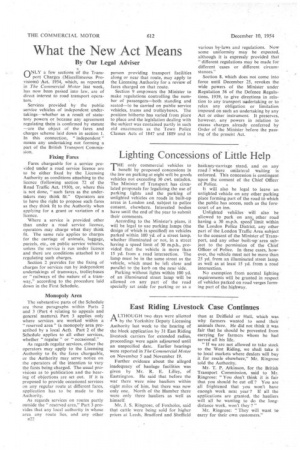What the New Act Means
Page 56

If you've noticed an error in this article please click here to report it so we can fix it.
By Our Legal Adviser
ONLY a few sections of the Transport Charges (Miscellaneous Provisions) -Act, 1954, which, as reported in The Commercial Motor last week, has now been passed into law, are of direct interest to road transport operators.
Services provided by the public service vehicles of independent undertakings--whether as a result of statutory powers or because any agreement regulating thim is confirmed by statute —are the object of the fares and charges scheme laid down in section 1. In this connection, " independent " means any undertaking not forming a part of the British Transport Commission.
Fixing Fares
Fares chargeable for a service provided under a road service licence are to be either fixed by the Licensing Authority as conditions attaching to the licence (following section 72 of the Road Traffic Act, 1930), or, where this is not done, "such fares as the undertakers may think fit." Operators are to have the right to propose such fares as they think fit to the Authority when applying for a grant or variation of a licence.
Where a service is provided other than under a road service licence, operators may charge what they think fit. The same rule applies to charges for the carriage of animals, luggage, parcels, etc., on public service' vehicles, unless the service is run under licence and there are conditions attached to it regulating such charges.
Section 2 provides for the fixing of charges for services run by independent undertakings of tramways, trolleybuses or "railways of the nature of a tramway," according to the procedure laid down in the First Schedule.
Monopoly Area
The substantive parts of the Schedule are those paragraphs within Parts 2 and 3 (Part 4 relating to appeals and general matters). Part 3 applies only where services are worked within a "reserved area" (a monopoly area prescribed by a local Act). Part 2 of the Schedule applies to all other services, whether " regular " or " occasional."
As regards regular services, either the operators may apply to the Licensing Authority to fix the fares chargeable, or the Authority may serve notice on the operators of the intention to vary the fares being charged. The usual provisions as to publication and the hearing of objections are set out. If it is proposed to provide occasional services on any regular route at different fares, application has to be made to the Authority.
As regards services on routes partly outside the " reserved area," Part 3 provides that any local authority in whose area any route lies, and any other B22 person providing transport facilities along or near that route, may apply to the Licensing Authority for a review of fares charged on that route.
Section 9 empawers the Minister to make regulations controlling the number of passengers—both standing and seated—to be carried on public service vehicles, trams and trolleybuses. The position hitherto has varied from place to place and the legislation dealing with the subject was contained partly in such old enactments as the Town Police Clauses Acts of 1847 and 1889 and in various by-laws and regulations. Now some uniformity may be expected, although it is expressly provided that "different regulations may be made for different cases or different circumstances."
Section 8, which does not come into force until December 25, revokes the wide powers of the Minister under Regulation 56 of the Defence Regulations, 1939, to give directions in relation to any transport usdertaking or to relax any obligation or limitation imposed on such an undertaking by any Act or other instrument: It preserves, however, any powers in relation to excess charges already conferred by Order of the Minister before the passing of the present Act.




















































































































